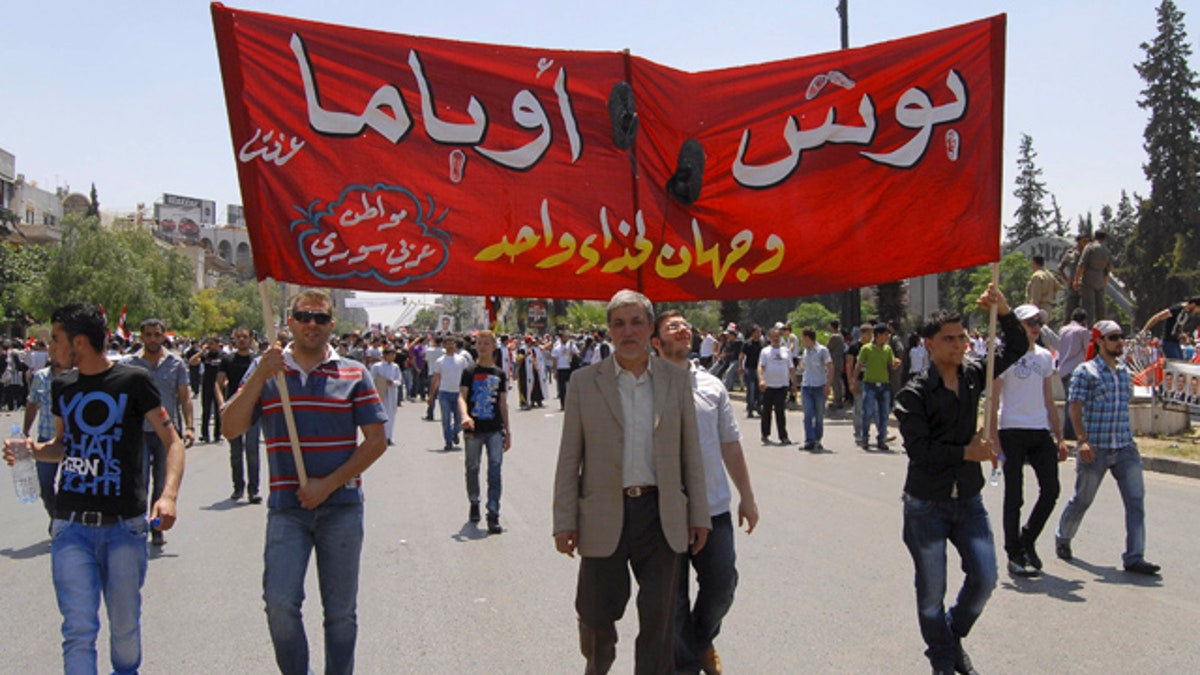
June 15: Supporters of Syrian President Bashar Assad carry a banner as they march along a highway during a demonstration to support their president, in Damascus, Syria. (AP)
BOYNUYOGUN REFUGEE CAMP, Turkey -- Syrian troops backed by tanks and firing heavy machine guns swept into a village near the Turkish border Saturday, cutting food supplies for nearly 2,000 refugees who have so far refused to leave their country. Many of those men, women and children will have no choice but to flee across the frontier if troops descend on them.
The Local Coordination Committees, a group that documents anti-government protests, said troops backed by six tanks and several armored personnel carriers, entered Bdama in the morning. The village, about 12 miles from the Turkish border, had a bakery that was the sole source of bread to the refugees crowded near the Turkish border. The town was also supplying medicine and other foodstuffs to the 2,000 Syrians who had hoped not to have to flee to the Turkish tent-city sanctuary.
"We still have some potatoes, rice and powder milk but they will run out soon," said Jamil Saeb, one of the Syrians who had so far decided to stay in Syria. "This is our first day without bread."
Saeb said there are children who are sick and there is no medicine. Others are picking apples for lack of other food.
"we are living in catastrophic conditions," he said. Some women and children were already crossing into Turkey Saturday afternoon.
"We are besieged by the border fence from one side and the Syrian army from the other," Saeb said by telephone. "We are expecting a humanitarian crisis within hours if Turkey does not send aid to us."
The British Foreign office, meanwhile, urged Britons in Syria to leave the country "immediately." In a statement posted on the website of the British Embassy in Syria, the Foreign Office said Britons should leave "now by commercial means while these are still operating."
The statement said those who stay should understand it would be unlikely the British Embassy in Damascus could provide a normal consular service if there was a "further breakdown in law and order."
Britain, France, Germany and Portugal will be sponsoring a draft resolution at the U.N. Security Council to condemn Syria.
The attack on Bdama occurred a day after Syrian forces swept into Maaret al-Numan, a town on the highway linking Damascus, the capital, with Syria's largest city, Aleppo. Saturday's assault on Bdama was about 25 miles to the west.
Also Saturday, the committees raised the death toll in Friday's anti-government protests to 19.
The three-month uprising has proved stunningly resilient despite a relentless crackdown by the military, pervasive security forces and pro-regime gunmen. Human rights activists say more than 1,400 Syrians have been killed and 10,000 detained as President Bashar Assad tries to maintain his grip on power.
Bdama is next to Jisr al-Shughour, a town that was spinning out of government control before the military recaptured it last Sunday. Activists had reported fighting in Jisr al-Shughour between loyalist troops and defectors who refused to take part in a continuing crackdown on protesters seeking Assad's ouster.
Saeb, the man on the border, said he fled Jisr al-Shughour shortly before the army took control. He declared he would rather die on the run or become an exile than face arrest and tortured by members of Syria's secret services.
"If the army advances here we will flee to Turkey," Saeb said.
The fighting in the area, that started nearly two weeks ago, displaced thousands of people including some 10,100 who are sheltered in Turkish refugee camps. On Friday, U.N. envoy Angelina Jolie traveled to Turkey's border with Syria to meet some of the thousands of Syrian refugees.
A Turkish villager near the border with Syria said hundreds of Syrians were crossing over Saturday afternoon in flight from the army advance.
"We expect more people to cross overnight," said the man, who would not give his name, fearing retribution.
Carol Batchelor, the representative of the United Nations High Commissioner for Refugees in Turkey said coping with the flow of Syrians was challenging.
"We have offered our full support from the United Nations, from each of our agencies, for any support that might be needed. Turkey has said for the time being they are able to manage the situation, to cope with the circumstances," she said.
The uprising is the boldest challenge to the Assad family's 40-year dynasty in Syria. Assad, now 45, inherited power in 2000, raising hopes that the lanky, soft-spoken young leader might transform his late father's stagnant and brutal dictatorship into a modern state.
But over the past 11 years, hopes dimmed that Assad was a reformist. He is showing himself as a hard-liner determined to keep power at all costs.
On Friday demonstrations, 12 people were killed in the central city of Homs, two in the eastern town of Deir el-Zour and two in the Damascus suburb of Harasta, one in the northern city of Aleppo. A boy believed to be 16 years old, who was in the streets protesting, and another person died in the southern village of Dael, the Local Coordination Committees said.
In the central city of Homs, most of the shops in the center were closed Saturday for the funeral of the dead. The procession, in which about 7,000 people participated, ended peacefully.
In neighboring Lebanon, the army finished its deployment in the northern city of Tripoli a day after clashes between supporters and opponents of the Syrian regime clashed. Seven people were killed and 59 wounded.
